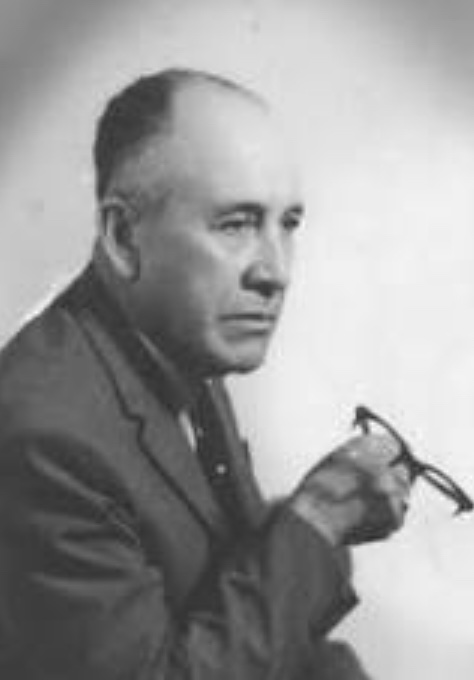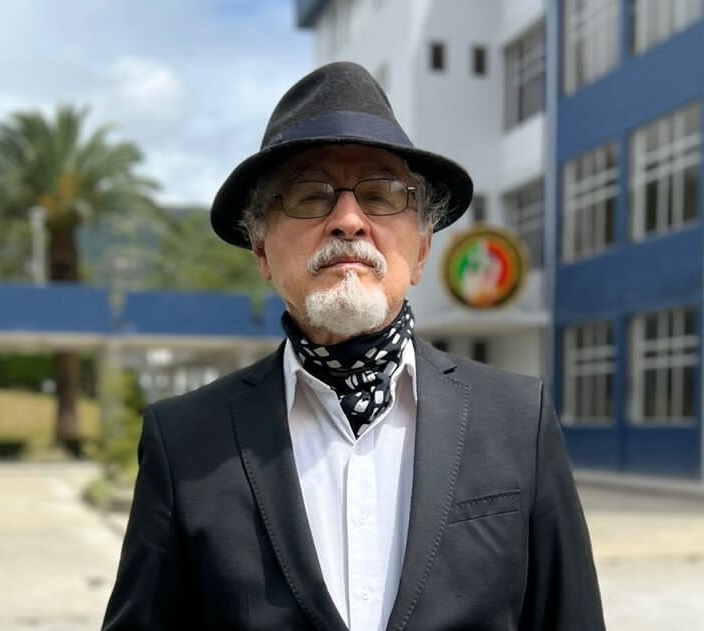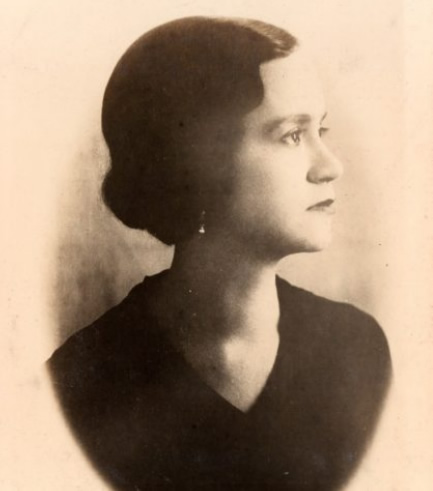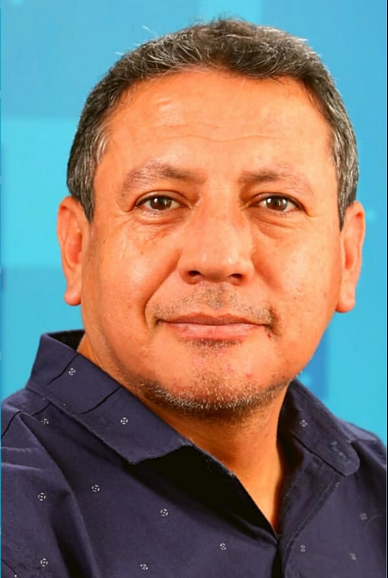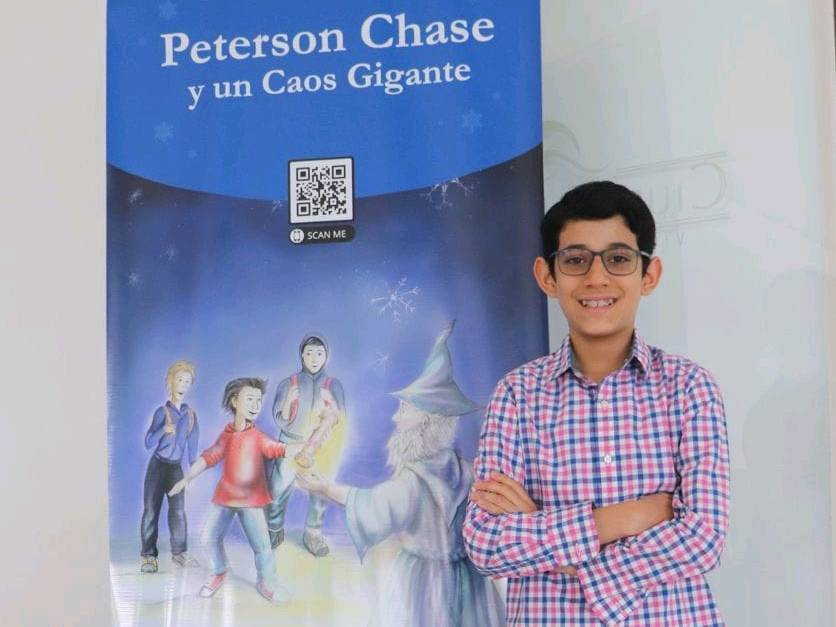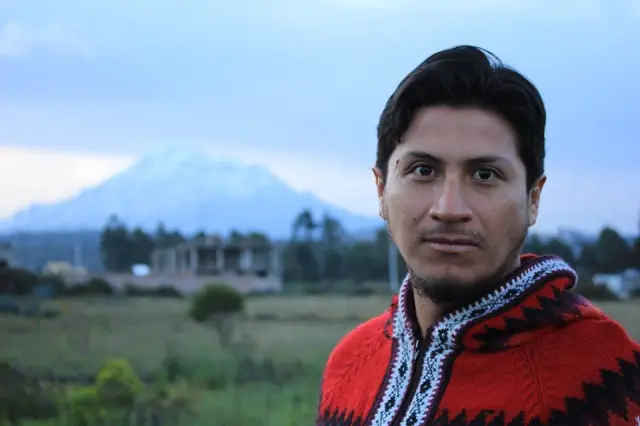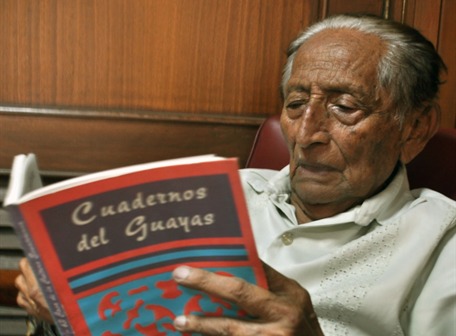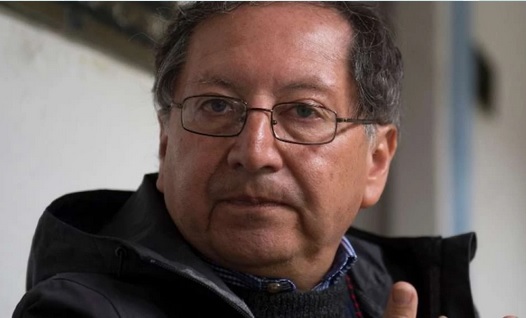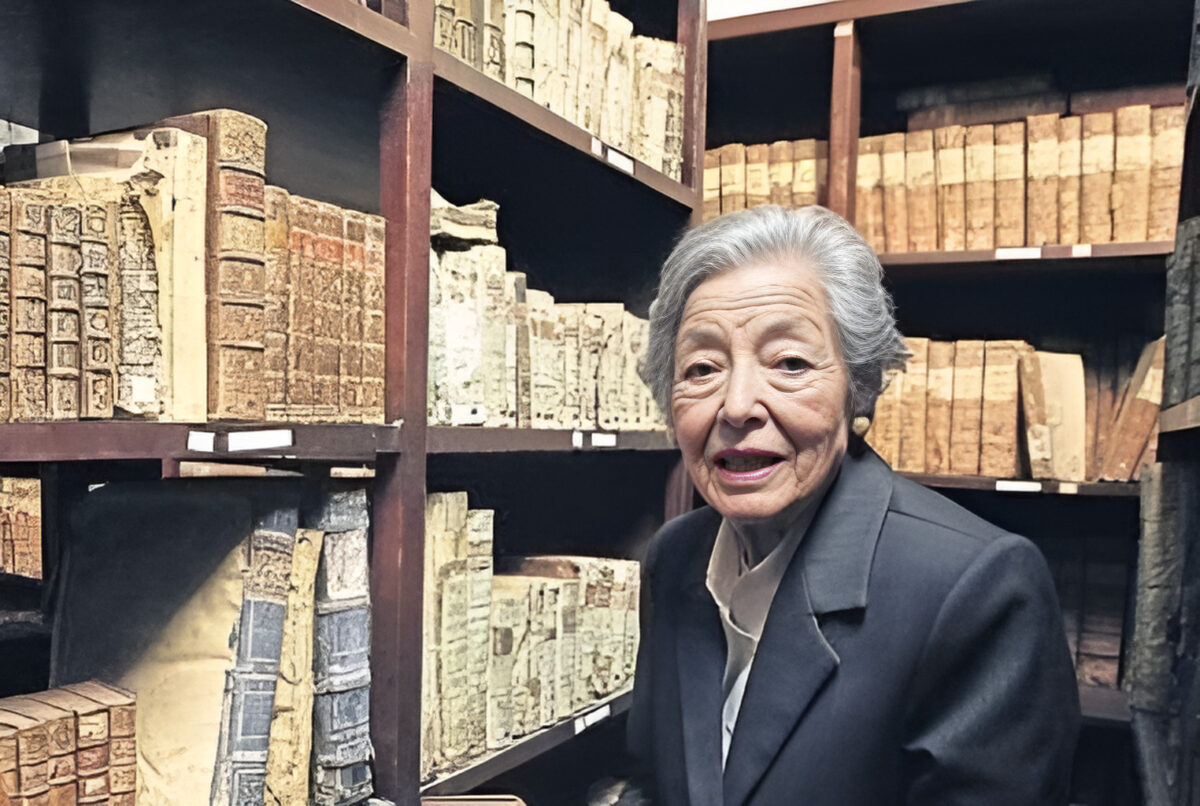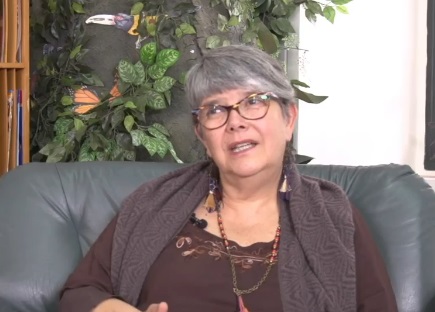Justino Cornejo Vizcaíno (Puebloviejo, Los Ríos, Ecuador, August 9, 1904 – Guayaquil, July 24, 1988) was a writer, educator, linguist, folklorist and scholar of Ecuadorian culture. He was a socialist and several times jailed at protests or by orders of Ecuadorian presidents. He published many articles in newspapers such as El Mercurio, El Día, Expreso, and El Telégrafo. He belonged to 22 foreign and 12 national institutions. In addition, he received twelve decorations, including that of Commander of the Order of Prince Henry (Ordem do Infante Dom Henrique) conferred by the President of Portugal. Some of his notable books include: “Diccionario del hampa guayaquileña” [Guayaquilean Underworld Dictionary] (1953), “Lengua i folclore” [Language and Folklore] (1963), and “El Quichua en el Castellano del Ecuador” [Quichua in Ecuador’s Spanish] (1967), to name a few. His complete works were published in 1989. Since then, previously unpublished works have been released, such as “Celda carcelaria” [Jail Cell] (2002), in which Cornejo writes about his experiences during his 90-day imprisonment in 1953 on the orders of Ecuadorian President José María Velasco Ibarra, who accused him of attempting to destabilize his government as an editorialist for La Nación newspaper. From 1946 until his retirement in 1968 he was a professor of Spanish and literature at the University of Guayaquil. In 1950, he became a member of Ecuador’s Academy of Language.
Continue reading “Justino Cornejo”Month: March 2023
Carlos Carrión
Carlos Alfonso Carrión Figueroa (Malacatos, Loja, January 25, 1944) is an Ecuadorian novelist and short story writer. He has won several prestigious literary awards, including the José de la Cuadra Award for his 1982 short story collection “El más hermoso animal nocturno” [The Most Beautiful Nocturnal Animal], the Joaquín Gallegos Lara Award twice, first for his 1995 short story book “El corazón es un animal en celo” [The Heart is an Animal in Heat] and later for his 2005 novel “¿Quién me ayuda a matar a mi mujer?” [Who’ll Help Me Kill My Wife?], which also earned him the “Lira y la Pluma” Award. Additionally, his work has been featured in various anthologies. In 2013, he won the Miguel Riofrío Award for his novel “La mantis religiosa” [The Praying Mantis]. Recently, in 2022, Carrión was honored with the Eugenio Espejo National Prize, the highest literary recognition in Ecuador.
Continue reading “Carlos Carrión”Matilde Hidalgo de Prócel
Matilde Hidalgo de Prócel (Loja, September 29, 1889 – Guayaquil, February 20, 1974) was an Ecuadorian physician, poet, and activist who was a pioneer for women’s rights in Ecuador and Latin America, becoming the first woman to vote in the country and the continent in 1924. As a doctor, she also became the first woman to earn a Doctorate in Medicine in Ecuador, using her platform to fight for women’s rights and improve healthcare for women and children. She was an active member of feminist organizations and expressed her views through poetry. Her legacy as one of the most important women in Ecuadorian history endures, inspiring future generations to fight for gender equality. Matilde Hidalgo was honored by Google on November 21, 2019, with a Google Doodle commemorating what would have been her 130th birthday.
Continue reading “Matilde Hidalgo de Prócel”Bertha Cando de Izurieta
Bertha Cando de Izurieta, also known as Bertha de Izurieta, was an exceptional Ecuadorian writer and journalist hailing from Cotopaxi. She broke barriers as the founding director of Cotopaxi Province’s very first newspaper, El Cotopaxi, which graced readers’ hands from July 24, 1959, until February 22, 1960. In 1962, she became Ecuador’s first-ever female President of a Municipal Council in the town of Saquisilí located in the Cotopaxi Province. Her husband, Gustavo Izurieta Obando, was the deputy director and proprietor of the publishing house, “Editorial Minerva.” Their son, Gustavo Izurieta, also took the reins as director for a few months. In 1954, Bertha’s novel, “Juventud inmolada” [Immolated Youth], was released under the banner of their publishing house.
Continue reading “Bertha Cando de Izurieta”Matilde de Ortega
Matilde Cabeza de Vaca de Ortega, known in the literary world as Matilde de Ortega, was an Ecuadorian writer. Her epistolary novel, “Lo que deja la tarde” (1955), is the sixth novel ever authored by a woman in Ecuador and the first by a woman to be published by the House of Ecuadorian Culture (CCE). In his 1976 study entitled, “Amazons and Artists: A Study of Ecuadorian Women’s Prose, ” American literary critic Michael Handelsman described her novel as: “the story of a woman who desires greater freedoms within the traditional framework of female life in Ecuador.” From 1957 to 1959, she served as the director of the CCE’s publishing house. In 1980, a short story by Ortega entitled, “El coche,” was published in an anthology entitled, “Cuentos fantásticos hispanoamericanos.”
Continue reading “Matilde de Ortega”Mario Conde
Mario Conde (Ambato, 1972) is a highly accomplished Ecuadorian writer, renowned for his works in children’s and youth literature. In addition to his successful writing career, he is also a distinguished university professor of Latin American Literature. Throughout his career, Mario has published numerous novels and volumes of short stories in collaboration with a variety of esteemed publishers such as Grupo Editorial Norma, Alfaguara Juvenil, Santillana, Loqueleo, SM el Barco de Vapor and Abracadabra Editores. In recognition of his literary achievements, he was awarded the prestigious Alicia Yánez Cossío Prize by the provincial government of the Pichincha province in 2003. With his remarkable talent, Mario has left an indelible mark on the Ecuadorian literary landscape and continues to inspire future generations of writers.
Continue reading “Mario Conde”Cristian Cevallos de la Torre
Cristian Cevallos de la Torre is an Ecuadorian writer. In 2022, at twelve-years old, he published a 113-page story, “Peterson Chase y un caos gigante” [Peterson Chase and a Giant Chaos], which he began writing at the age of 7. The book, which is also available in English, is full of magic, fantasy and adventure. It was published by Lux et Gaudium, a publishing company created by his mother Ana de la Torre to release his book. Among those who accompanied him during the book’s launch presentation were former Ecuadorian Vice President and writer Rosalía Arteaga and the award-winning Argentine poet and writer Ernesto Kahan. Cevallos intends to write a sequel to his book.
Continue reading “Cristian Cevallos de la Torre”Freddy Ayala Plazarte
Freddy Ayala Plazarte (Aláquez, Latacunga, Ecuador, 1983) is an Ecuadorian poet, essayist, and university professor. In 2015, his poetry book “Rebeliones al filo de una sinfonía” won the prestigious Jorge Carrera Andrade National Poetry Prize. His latest poetry book, “Un siglo en el vientre de las vasijas” (2021) was a finalist of the 2nd edition of the Vicente Huidobro International Poetry Award, Valparaíso. He has written several literary studies, including “Vientos paralelos: acotaciones sobre cultura y literatura latinoamericana” (2015) and two studies on poet Hugo Mayo. He was a member of the literary workshops at the House of Ecuadorian Culture during 2005-2007. He was a member of the literary group la.kbzuhela of Quito. He is a professor at the Central University of Ecuador.
Continue reading “Freddy Ayala Plazarte”Cristóbal Garcés Larrea
Cristóbal Garcés Larrea (Guayaquil, April 20, 1924 – May 2017) was an Ecuadorian poet, editor, and literary critic. He was the editor-in-chief of Cuadernos del Guayas, the official magazine of the Guayas chapter of the House of Ecuadorian Culture, which was created by Carlos Zevallos Menéndez and whose prior editors-in-chief were Adalberto Ortiz and Francisco Pérez Febres Cordero (albeit for short periods). In 1944, he and Galo René Pérez, Jorge Enrique Adoum and Enrique Noboa Elizaga published the literary magazine Madrugada. In 1970, he released a book series that included stories by then-contemporary writers from certain Latin American countries or regions (which he compiled and edited), including: “Narradores Centroamericanos Contemporáneos,” “Narradores Cubanos Contemporáneos,” “Narradores Colombianos Contemporáneos,” and “Narradores Brasileños Contemporáneos.” He published several of his poems in magazines in Ecuador but a collection of his poems has never been published as a book. He worked for many years as a professor.
Continue reading “Cristóbal Garcés Larrea”Diego Velasco Andrade
Diego Velasco Andrade (Quito, 1958) is an Ecuadorian poet, fiction writer, editor, professional architect, and university professor. In 1982, he joined Miguel Donoso Pareja’s Literary Workshop at the House of Ecuadorian Culture. He has published a number of poetry collections and fiction books. Since the 1980s, he has been a professor of Semiotics and Design at the Central University of Ecuador. His 2002 novel “¿El poeta ha muerto?” [Is the Poet Dead?] was adapted for the stage by the Ecuadorian group Ojo de Agua and staged in Ecuador, Spain and Belgium. In the 1980’s he was a founding member of a literary group called El Matapiojo. For many years, starting in 2005, he directed the literary workshops of the House of Ecuadorian Culture. His works have appeared in several Ecuadorian literary anthologies.
Continue reading “Diego Velasco Andrade”Michael H. Handelsman
Michael H. Handelsman (Weehawken, New Jersey, United States, May 11, 1948) is an American university professor, scholar, literary critic, and writer. He is professor emeritus of Latin American literature at the University of Tennessee, Knoxville, where he has been teaching since 1976. He has directed the university’s Latin American Studies and Global Studies programs. His principal area of specialization is Ecuadorian literature and culture. Some of his books include: “Amazonas y artistas: Un estudio de la prosa de la mujer Ecuatoriana” (1978), “Lo afro y la plurinacionalidad: el caso ecuatoriano visto desde su literatura” (1999), and “Leyendo la globalización desde la mitad del mundo: identidad y resistencias en el Ecuador” (2005) which received the Isabel Tobar Guarderas award in Quito and the A.B. Thomas award in the U.S. He’s also written extensively on Benjamín Carrión, including: “En torno al verdadero Benjamín Carrión” (1989), “El ideario de Benjamín Carrión” (1992) and “Benjamín Carrión: el pensamiento fundamental” (2007). He’s been a visiting professor at the University of Kentucky, the Catholic University of Santiago de Guayaquil (UCSG), and the Simon Bolivar Andean University of Quito. Since November 12, 2012, he’s been a foreign corresponding member of Ecuador’s National Academy of Language.
Continue reading “Michael H. Handelsman”Laura Romo de Crespo
Laura Romo Rivera de Crespo Toral (Baños, March 28, 1916 – Quito, February 2011) was a renowned Ecuadorian librarian and cultural figure. She served as the director of the National Library “Eugenio Espejo” for over six decades, from 1945 to 2008, playing a key role in preserving Ecuador’s literary heritage. As a founding member of the Casa de la Cultura Ecuatoriana, she contributed to the growth of the library’s collection and was a trusted source of knowledge for Ecuadorian intellectuals. Her dedication to literature and culture left an enduring legacy in the country.
‘Soledad Córdova
Soledad Córdova, or Soledad Fernández de Córdova (Quito, December 19, 1957) is an Ecuadorian writer of children’s literature, poet, and a librarian. On October 24, 2008 she was appointed director of the Eugenio Espejo National Library of Ecuador, replacing Laura Romo de Crespo. Córdova belonged to the literary workshops of Abdón Ubidia and Diego Velasco. She was a fellow at the Reference Service of the National Library of Spain, and at the General Directorate of Books, Archives and Libraries of the Ministry of Culture of Spain. Her works have received national and international awards.
.
Continue reading “Soledad Córdova”Francisco Delcasty
Francisco Delcasty was a revolutionary Ecuadorian poet and member of the Communist Party of Ecuador. He authored his most famous poem a day after the National Army massacred over a thousand striking workers during the Guayaquil general strike of 1922, which starts with the line “El hambre va en desfile” [Hunger is marching]. In 1970, the House of Ecuadorian Culture published a collection of his poems entitled, “Alpha y omega: apoesía.” The renowned Guayaquilean poet Sergio Román Armendáriz dedicated a poem to him entitled, “Puerto Rico en el Llanto” in the book “Club 7” (1954). Román was friends with Delcasty during the 1950’s and said in an interview that he believed Delcasty was likely a Spaniard (born with the last name Castillo) who was considered Ecuadorian because of his close ties to Ecuador and its politics.
Continue reading “Francisco Delcasty”
